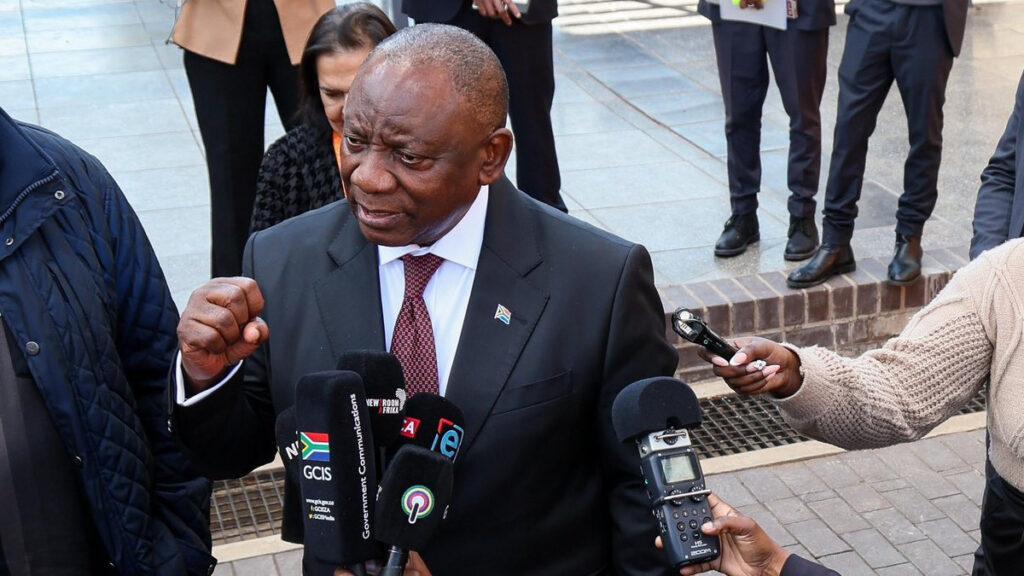Africa-Press – South-Africa. President Cyril Ramaphosa says the government is doing what it can to support South Africa’s century-old automotive manufacturing industry, which is under siege from changing global demands and the United States’ looming 30% tariffs.
The president attended the launch of BMW’s new X3 plug-in hybrid at the company’s Rosslyn plant in Tshwane last week, which will help South Africa establish a foothold in the shift to electric vehicles.
The president said this was a crucial step to protect the industry, which directly employs over 115,000 people and supports over 500,000 jobs throughout the value chain.
Ramaphosa remarked that the auto sector has grown to become the largest manufacturing sector in the country since the first assembly plants were established in the Eastern Cape in the 1920s.
Companies like Toyota, Ford, Nissan, Volkswagen, BMW and Mercedes-Benz have established plants in South Africa that produce vehicles for the local market and for export to other countries, contributing around 5.3% to GDP.
However, South Africa’s auto sector has come under increasing pressure, with stricter vehicle emissions regulations in export destinations such as the European Union, a growing global shift towards electric vehicles, and tariffs imposed by the United States.
Several countries have laid out plans to phase out internal combustion engine vehicles, with deadlines in the EU set between 2030 and 2040. Unless South Africa adapts quickly, the auto sector is in for a rough time.
Making matters worse, the auto sector is currently suffering from a US-led tariff and trade war that is targeting automotive manufacturing specifically.
In April 2025, US President Donald Trump announced a 25% tariff on auto exports to the United States, on top of a universal 10% tariff that was implemented that same month.
This led to an immediate decline in South African exports to the US, which have dropped by 87% since April.
From 1 August, South Africa will be hit by a 30% tariff on most of its exports to the United States, with the threat of an additional 10% ‘BRICS tariff’ also hanging over its head.
According to Ramaphosa, the sector will be hit hard, as exports currently account for approximately two-thirds of local vehicle production.
The automotive sector is also the greatest beneficiary of South Africa’s participation in the African Growth and Opportunity Act (AGOA), a benefit that the tariffs have effectively wiped out.
The pressure will mount even further when the country is likely to be booted from the programme later this year.
“It is critical that we strengthen the sector to not only overcome current headwinds but to ensure its long-term sustainability,” the president said.
Government is working to support the sector
The president said that government support for the car manufacturing industry is coming through the Automotive Production and Development Programme, which is trying to position South Africa as a key global manufacturing base for future vehicles.
He said this includes manufacturer-led initiatives like training academies to upskill the country’s workforce on competencies like electric vehicle assembly and robotics.
The government also wants to help create and build new companies across the entire value chain through multi-billion-rand developments like the Tshwane Automotive Special Economic Zone.
“There are also a number of industry-driven training initiatives focusing on technical and artisanal skills, and deepening collaboration between government departments, vocational colleges and companies to grow a new skills pipeline,” he said.
“Protecting existing jobs in the sector is paramount, particularly in the light of the looming US tariffs.”
To address the threat of the current and coming US tariffs, Ramaphosa said the government is working to diversify its export base, with a particular focus on the SADC region.
The SADC and the broader African Continental Free Trade Area (AfCFTA) have repeatedly been posited as significant opportunities for South African exports in the face of the United States’ tariff blockade.
However, Ramaphosa said it is crucial that South Africa’s auto industry is equipped to build into a new era of vehicle production.
Source: businesstech
For More News And Analysis About South-Africa Follow Africa-Press






